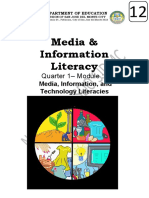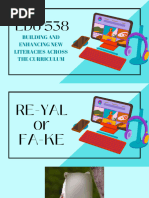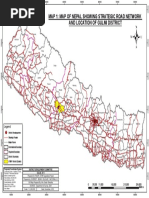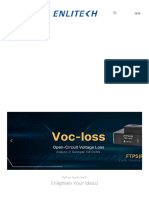0 ratings0% found this document useful (0 votes)
17 viewsEp03 - Sityar Maribelle B - Le3
Ep03 - Sityar Maribelle B - Le3
Uploaded by
Airah Maribelle SityarThe document discusses a webinar about using media and digital literacy to combat misinformation. It provides context for the webinar, describes the speaker and topics covered. Key points discussed include the importance of media literacy, distinguishing misinformation from disinformation, and the role of educators online.
Copyright:
© All Rights Reserved
Available Formats
Download as PDF, TXT or read online from Scribd
Ep03 - Sityar Maribelle B - Le3
Ep03 - Sityar Maribelle B - Le3
Uploaded by
Airah Maribelle Sityar0 ratings0% found this document useful (0 votes)
17 views5 pagesThe document discusses a webinar about using media and digital literacy to combat misinformation. It provides context for the webinar, describes the speaker and topics covered. Key points discussed include the importance of media literacy, distinguishing misinformation from disinformation, and the role of educators online.
Original Title
Ep03_sityar Maribelle B_ Le3
Copyright
© © All Rights Reserved
Available Formats
PDF, TXT or read online from Scribd
Share this document
Did you find this document useful?
Is this content inappropriate?
The document discusses a webinar about using media and digital literacy to combat misinformation. It provides context for the webinar, describes the speaker and topics covered. Key points discussed include the importance of media literacy, distinguishing misinformation from disinformation, and the role of educators online.
Copyright:
© All Rights Reserved
Available Formats
Download as PDF, TXT or read online from Scribd
Download as pdf or txt
0 ratings0% found this document useful (0 votes)
17 views5 pagesEp03 - Sityar Maribelle B - Le3
Ep03 - Sityar Maribelle B - Le3
Uploaded by
Airah Maribelle SityarThe document discusses a webinar about using media and digital literacy to combat misinformation. It provides context for the webinar, describes the speaker and topics covered. Key points discussed include the importance of media literacy, distinguishing misinformation from disinformation, and the role of educators online.
Copyright:
© All Rights Reserved
Available Formats
Download as PDF, TXT or read online from Scribd
Download as pdf or txt
You are on page 1of 5
EDUTALK 2:
“the media and digital literacy to
combat misinformation”
I N T R O D U C T I O N
"Technology will not replace great teachers but technology in the
hands of great teachers can be transformational."
- George Couros
The teacher's primary responsibility is to promote
social learning. Students engage, discuss, and collaborate
in social learning, which fosters a good, inter-personal
learning environment. It entails adopting a flexible and
participatory strategy that promotes class participation
while simultaneously maintaining a'real-time' sensitivity to
individual requirements. This form of learning emphasizes
the application of knowledge, it also promotes higher-order
thinking skills like analysis and assessment, as well as the
development of communicative competence in the case of
language acquisition. EduTalk 2 broadened students'
understanding of how technology may help them.
O B J E C T I V E S
Discover several channels of media and digital literacy
in the classroom.
Integrate the skills needed to combat misinformation in
the teaching and learning process.
Recognize the ethical ways of using the media in the
digital world.
N A R R A T I O N O F E X P E R I E N C E S
College of Education second online webinar was held
through Zoom gathering from 1:00 to 2:30 pm on
January 27, 2022. It has a subject "Media and Digital
Literacy in Classroom to Combat Misinformation". Yet
again as a feature of their preparation, the COED
Practice Teachers were needed to go to the online
course. Ms. Ranniella Marie B. Umayan and Mr. Andrei
Michael B. Gavijan of BSED IV Mathematics filled in as
the emcees. The online class officially began with a
concise supplication drove by Ms. Jeremy Lyka
Guevarra of BSED IV Mathematics, which was trailed by
the singing of the National Anthem and LU Hymn.
Besides, Professor Bermudez shared their encounters
before where technologies are not their wellspring of
data. She told that everybody is fortunate to have
instant information when it is required. Then again, she
reminded everybody to utilize technology cautiously as it
is the obligation of instructors to spread honest
messages.
Ms. Geralden C. Anciano presented the guest
speaker. The program proceeded with an intuitive
conversation about "Exploring the Cyberspace as an
Educator/Professional." Sir Ronuel del Rosario, shared
the need of Media Literacy and how people become
basic evaluators of data on the web. Realizing how
widespread fake news is in the present society.
N A R R A T I O N O F E X P E R I E N C E S
He sought after the crowd to partake in the discussion by
permitting them to react on his presentation using perdeck
online site. He handled organization behavior and the
contrast between misinformation and disinformation, how we
assess information, and how to react to counterfeit news.
His discussion went impeccably introduced, it was fun and
intuitive. He accentuated in his discussion that educators is
a monitor and not a dictator, saying that instructors could
essentially assist students with picking up utilizing
innovation.
Mr. Romuel Del Rosario, the guest speaker, was
presented with certificates by Ms. Jamaica May Barachina
of BSED 4 Science. The closing remarks were given by Ms.
Leah E. Perez. Then, as part of the program's
documentation, a photograph was taken. Mr. Andrei Michael
Gavijan and Ms. Raniella Marie Umayan, the emcees, once
again gave the closing comments address. The students
sang their College of Education Hymn at the end of the
lecture.
I N S I G H T S G A I N E D
After the orientation, I have learned the
following:
Media Literacy is a critical thinking to understand media
messages and the usage of media to create one's own
messages.
You are what you post.
Ranting about something online is a toxic behavior.
A teachers language inside the classroom may be
different from how they would behave on social media.
Professionals are expected to have a decent online
presence.
Misinformation is an information that was mistakenly
spread, it does not intend to deceive. On the other
hand, disinformation is a false information intended to
influence opinions and obscure truth.
P I C T U R E S I N A C T I O N
EduTalk 2:
The Media and Digital
Literacy to Combat
Misinformation
Mr. del Rosario
compelling the
difference
between
misinformation
and
disinformation
COED students
participating
the EduTalk 2
Webinar
You might also like
- Thematic Appreciation Test (T.a.T)Document27 pagesThematic Appreciation Test (T.a.T)qaur.2510No ratings yet
- Properties of Aluminium and Its AlloyDocument101 pagesProperties of Aluminium and Its AlloyDa WongNo ratings yet
- S10 27Document5 pagesS10 27Kapil Dalvi0% (1)
- 63M0002-D Project General Technical Specification PDFDocument69 pages63M0002-D Project General Technical Specification PDFVasiljka Đordan Jelaca100% (1)
- M3 Lesson 3.1Document8 pagesM3 Lesson 3.1Honey Na PinagpalaNo ratings yet
- EDUC 2209 Learning Task M3 2Document2 pagesEDUC 2209 Learning Task M3 2Richelle MasingNo ratings yet
- Blue and Yellow Introduction to Media and Information Literacy PresentationDocument45 pagesBlue and Yellow Introduction to Media and Information Literacy PresentationnyxiiiigarciaNo ratings yet
- Elc Digital LiteracyDocument20 pagesElc Digital LiteracymachadolopesNo ratings yet
- Innovative Teaching StrategiesDocument97 pagesInnovative Teaching StrategiesRAYMON ROLIN HILADO100% (1)
- Module-2 QTR-1 MilDocument20 pagesModule-2 QTR-1 MilCharmaine CapaNo ratings yet
- Final Mil DoneDocument55 pagesFinal Mil DoneMariel Yeng Suing100% (1)
- Media Information Literacy by CJ NICOLE SURIAGADocument30 pagesMedia Information Literacy by CJ NICOLE SURIAGAcj.suriagaNo ratings yet
- MIL WK 1Document16 pagesMIL WK 1Mebet MoralesNo ratings yet
- COMPILATIONDocument8 pagesCOMPILATIONEvony Grace CarulasanNo ratings yet
- The Description of Media Literacy, Information Literacy and Technology LiteracyDocument6 pagesThe Description of Media Literacy, Information Literacy and Technology LiteracyLea NovelaNo ratings yet
- MIL - Week 1Document21 pagesMIL - Week 1Aira Manuba MozoNo ratings yet
- PROF ED 10 Chapter 5Document17 pagesPROF ED 10 Chapter 5jesriel.eneridoNo ratings yet
- 21st Century TeacherDocument20 pages21st Century TeacherJoboy FritzNo ratings yet
- g4 ArticleDocument11 pagesg4 Articleapi-329361916No ratings yet
- Media and Digital LiteracyDocument68 pagesMedia and Digital Literacyamorflores112602No ratings yet
- MODULE 5 IN BUILDING AND ENHANCING NEW LITERACIES ACROSS THE CURRICULUMDocument5 pagesMODULE 5 IN BUILDING AND ENHANCING NEW LITERACIES ACROSS THE CURRICULUMElmo AdorNo ratings yet
- Tor Media LiteracyDocument2 pagesTor Media LiteracyKyla mae CastilloNo ratings yet
- Critical Digital Media LiteracyDocument13 pagesCritical Digital Media Literacyapi-719338290No ratings yet
- Mil Q3 Law2Document4 pagesMil Q3 Law2Maria Bettina DizonNo ratings yet
- 12 1 - 4core MilDocument42 pages12 1 - 4core MilJoana RoxasNo ratings yet
- Media and Information Literacy: AcademicsDocument13 pagesMedia and Information Literacy: Academicsariel agosNo ratings yet
- Globalization and CommunicationDocument3 pagesGlobalization and Communicationmark100% (1)
- Ge5 Part Ii (Prelim)Document5 pagesGe5 Part Ii (Prelim)s.mansaloon.napthalyNo ratings yet
- Media and Information Literacy: Department of EducationDocument4 pagesMedia and Information Literacy: Department of EducationLea NovelaNo ratings yet
- Media-And-Information-Literacy Mil12 Q3 M1Document14 pagesMedia-And-Information-Literacy Mil12 Q3 M1benedictdagundonNo ratings yet
- Ang DagaDocument3 pagesAng Dagalarahandes03No ratings yet
- Introduction To Media and Information LiteracyDocument10 pagesIntroduction To Media and Information LiteracyJomark RebolledoNo ratings yet
- Module-1 Mil First-Quarter FinalDocument23 pagesModule-1 Mil First-Quarter FinalSarah Jean Formentera - Paring86% (7)
- Information and Communication Technology (Final Project)Document13 pagesInformation and Communication Technology (Final Project)ScribdTranslationsNo ratings yet
- A Comparative Study On Media Literacy Among School Children in Pudukkottai and Madurai DistrictDocument6 pagesA Comparative Study On Media Literacy Among School Children in Pudukkottai and Madurai DistrictarcherselevatorsNo ratings yet
- Global PerspectiveDocument6 pagesGlobal PerspectiveDaisy Rose EliangNo ratings yet
- Activity 1 PrefinalDocument5 pagesActivity 1 PrefinalLynnah SibongaNo ratings yet
- ED034 - Act5 - CALVADORES, JOHN AIKEEDocument8 pagesED034 - Act5 - CALVADORES, JOHN AIKEEGaisano Capital Tacloban MainNo ratings yet
- EDU-534-EDU-536-EDU-538 (1)Document72 pagesEDU-534-EDU-536-EDU-538 (1)reignalexismendoza.26No ratings yet
- Media LiteracyDocument18 pagesMedia LiteracyShy PaguiganNo ratings yet
- ScriptDocument8 pagesScriptfloverjan33No ratings yet
- Module 5 Building LiteracyDocument12 pagesModule 5 Building LiteracyDesiree Kaye MarianoNo ratings yet
- Lesson 1 Introduction To Media and Information LitearcyDocument32 pagesLesson 1 Introduction To Media and Information LitearcyEunice PereñaNo ratings yet
- MIL 11 12 Q3 0102 What Is Media and Information Literacy PSGC 1Document15 pagesMIL 11 12 Q3 0102 What Is Media and Information Literacy PSGC 1maria caliNo ratings yet
- 21st Century SkillsDocument5 pages21st Century SkillsAlvin KatanoNo ratings yet
- My Portfolio: Asinan Poblacion, Subic, Zambales SY 2020-2021Document3 pagesMy Portfolio: Asinan Poblacion, Subic, Zambales SY 2020-2021KRISHAN MAE GALLARDONo ratings yet
- Technology For Teaching and LearningDocument7 pagesTechnology For Teaching and LearningJanelle Mikaela100% (1)
- UntitledDocument22 pagesUntitledNicole TogononNo ratings yet
- Final ResearchDocument28 pagesFinal ResearchAdona RomasantaNo ratings yet
- Media Literacy-A National Priority For A ChangingDocument13 pagesMedia Literacy-A National Priority For A ChangingMarianaNo ratings yet
- Handouts For Media Info LiteracyDocument25 pagesHandouts For Media Info LiteracyJonathan23d100% (1)
- IntroDocument24 pagesIntrojulliana.cdecenaNo ratings yet
- .trashed-1669790733-MODULE 5 EDUC 5Document4 pages.trashed-1669790733-MODULE 5 EDUC 5Lynlyn EduaveNo ratings yet
- Kristine Bernadette ADocument4 pagesKristine Bernadette AKristine Bernadette NuestroNo ratings yet
- LAYOSADocument19 pagesLAYOSAreignjulsNo ratings yet
- Digital Literacy and Citizenship in The 21st CenturyDocument16 pagesDigital Literacy and Citizenship in The 21st CenturyaspentaskforceNo ratings yet
- 1stsem - MIL 2021Document208 pages1stsem - MIL 2021Symra StbNo ratings yet
- Exploring The Landscape of Media Literacy Education - A Discussion of Three Key ArticlesDocument5 pagesExploring The Landscape of Media Literacy Education - A Discussion of Three Key ArticlesHasan Mert KaplanNo ratings yet
- 4.ARTICLE3 Final2015 2Document16 pages4.ARTICLE3 Final2015 2latoidahordestinyNo ratings yet
- Instructional Materials For Media and Information Literacy: Nix (COMPANY NAME) (Company Address)Document56 pagesInstructional Materials For Media and Information Literacy: Nix (COMPANY NAME) (Company Address)Mark Jerico MoralesNo ratings yet
- Purposive Communication Unit 2-4Document16 pagesPurposive Communication Unit 2-4emat mendozaNo ratings yet
- 2.-MILPT-U1L2 (1)Document13 pages2.-MILPT-U1L2 (1)jimmypadios91No ratings yet
- Sir PeterDocument2 pagesSir Peterkiethcallada137No ratings yet
- STS Notes: Human FlourishingDocument4 pagesSTS Notes: Human Flourishingjeisan030605No ratings yet
- Map1.map of NepalDocument1 pageMap1.map of NepalGopi Raj PunNo ratings yet
- Final ExamDocument4 pagesFinal ExamMuhamad Syahmi AdnanNo ratings yet
- Topic 7 JournalizingDocument11 pagesTopic 7 JournalizingMark LeeNo ratings yet
- Solar Simulator - Basic Knowledge and Working PrinciplesSolar Simulator - Basic Knowledge and Working Principles We Enlighten Your Ideas!Document19 pagesSolar Simulator - Basic Knowledge and Working PrinciplesSolar Simulator - Basic Knowledge and Working Principles We Enlighten Your Ideas!Lif AhadiNo ratings yet
- Conditionally Assign A Color To A Cell in ALV Report Using Class CL - GUI - ALV - GRID - SAP BlogsDocument3 pagesConditionally Assign A Color To A Cell in ALV Report Using Class CL - GUI - ALV - GRID - SAP BlogsAdrian RodriguezNo ratings yet
- VI Salón Del Humor GráficoDocument92 pagesVI Salón Del Humor GráficoJudith CaicedoNo ratings yet
- Analyticaltechniques12 PDFDocument7 pagesAnalyticaltechniques12 PDFZaidNo ratings yet
- The Contemporary World Lesson 5 ReviewerDocument3 pagesThe Contemporary World Lesson 5 ReviewerGrace MendezNo ratings yet
- Complete Rotational System Manual ME 8950A PDFDocument49 pagesComplete Rotational System Manual ME 8950A PDFSindi DayanaNo ratings yet
- Journal SPPFDocument7 pagesJournal SPPFDraw for KidsNo ratings yet
- Shell Risella X Next Generation Process Oils BrochureDocument8 pagesShell Risella X Next Generation Process Oils BrochureLjupco AleksovNo ratings yet
- SBS 3510 Hydrometer Cut SheetDocument1 pageSBS 3510 Hydrometer Cut SheetQazi M Asim WasimNo ratings yet
- Stoic Week For Students HandbookDocument34 pagesStoic Week For Students HandbookcalookaNo ratings yet
- 2020 02 March PDFDocument64 pages2020 02 March PDFGenecyst15082No ratings yet
- Rev2 - Task2 Excel Test For Candidates.Document8 pagesRev2 - Task2 Excel Test For Candidates.ondiwadomnicNo ratings yet
- 2008年6月英语六级真题Document24 pages2008年6月英语六级真题20231102faxuejiaNo ratings yet
- Shell Rimula R3 Turbo 15W-40Document2 pagesShell Rimula R3 Turbo 15W-40Muhammad SaputraNo ratings yet
- ME5204 Finite Element Analysis: Class 18Document8 pagesME5204 Finite Element Analysis: Class 18Obulapuram Sai Pavan Kumar me17b157No ratings yet
- Course File IndexDocument2 pagesCourse File IndexGajendran A MECH KIOTNo ratings yet
- Social Problems Essay TopicsDocument5 pagesSocial Problems Essay Topicsdstqduwhd100% (2)
- 13 - 10personal Swot - MbtiDocument2 pages13 - 10personal Swot - MbtiBích BùiNo ratings yet
- Department of Education: Ely S. Ubaldo, Ceso ViDocument3 pagesDepartment of Education: Ely S. Ubaldo, Ceso ViMoises Von De GraciaNo ratings yet
- Desalination: Water For A Sustainable WorldDocument2 pagesDesalination: Water For A Sustainable Worldshrinath2kNo ratings yet
- Maths Class Xii Chapter 07 Integrals Practice Paper 07 AnswersDocument8 pagesMaths Class Xii Chapter 07 Integrals Practice Paper 07 Answerskumar pNo ratings yet
- Hydro TerminologyDocument5 pagesHydro Terminologybrycg.1998No ratings yet

























































































